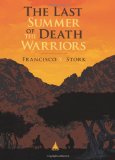
 The Last Summer of the Death Warriors
The Last Summer of the Death WarriorsReviewed April 20, 2010.
Arthur A. Levine Books (Scholastic), 2010. 344 pages.
Starred Review
Here's another book by the brilliant author of Marcelo in the Real World. Like Marcelo, this book deals with many-layered issues in a realistic way that is ultimately inspiring. There are no easy answers here, but we see flawed and lovable people grappling with the basic questions of life.
The book opens as Pancho is being brought to an orphanage.
It was not a place for kids with problems. Mrs. Olivares had worked very hard and called in a lot of favors to get him admitted. She pointed out the high school he would attend in the fall. It was within walking distance of St. Anthony's. He had been given a choice between going to summer school and entering as a senior or redoing his junior year. He chose to redo his junior year. He had other plans for the summer.
Father Concha is the one in charge at St. Anthony's.
Father Concha picked up a manila folder and flipped through the pages, deep in thought. What did those pages say? Pancho had never read his file, but he could imagine. The mother dies when the boy is five years old. The father raises the boy and the older sister. The father dies in a freak work-related accident. Then the sister dies from undetermined natural causes three months later. The list of losses that made up his life was so unbelievable, it was embarrassing. It was like he made the whole thing up just so people would feel sorry for him.
Pancho glared at Father Concha. he did not want pity. Pity turned his stomach. The priest put the folder down and met Pancho's eyes. There was no pity there.
At the orphanage, Pancho meets D.Q., a kid his own age who is dying of cancer. D.Q. takes an interest in Pancho. D.Q.'s mother, who left him at the orphanage years before, is now trying to get him to try some experimental treatments in Albuquerque. D.Q. agrees to go, but wants Pancho to come with him.
Pancho agrees because of his own summer plans: To find the man who was with his sister when she died, and kill him.
D.Q. also has his own agenda. A girl named Marisol works at Casa Esperanza, the house where they'll be staying near the hospital.
D.Q. is always writing in his journal. He's writing the Death Warrior Manifesto. A Death Warrior affirms life. He sucks the marrow from life with every day he has been given. D.Q. intends to train Pancho to be a Death Warrior, too. Pancho just thinks he's crazy.
Things happen. Marisol isn't what Pancho expected. He gets drafted to give rides to young kids with cancer at Casa Esperanza and makes friends with them. He watches D.Q. getting sick from chemotherapy. He makes plans to go to the house of the man who was with his sister and kill him.
There's nothing simplistic about this book. It's much more than a story of a teen with cancer or the story of a teen seeking revenge. In a lot of ways, it's a book exploring what life is all about.
This book leaves you satisfied in a quiet way, glad to have spent time with Pancho and D.Q. and Marisol.
